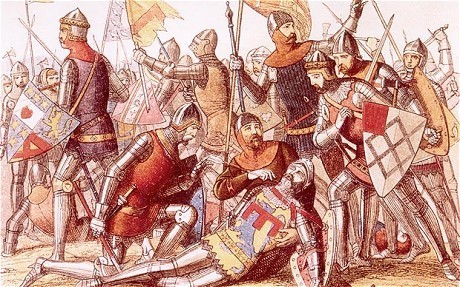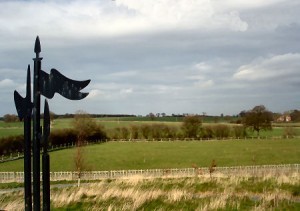On This Day in History…
… King Henry IV defeated a rebel army including nobleman Henry Percy, the famous "hotspur" of Shakespearean fame, at the Battle of Shrewsbury in 1403. It is said to have been one  of the bloodiest battles in English history. The Percy family, Earls of Northumberland, had helped Henry IV usurp the throne from King Richard II four years before but they considered that they had not been sufficiently well rewarded for their support and so rose in rebellion against the King. Sir Henry Percy, son of the Earl of Northumberland, was an outstanding soldier who aimed to join forces with the Mortimer Earls of March and the Welsh Prince Owain Glyn Dwr.
of the bloodiest battles in English history. The Percy family, Earls of Northumberland, had helped Henry IV usurp the throne from King Richard II four years before but they considered that they had not been sufficiently well rewarded for their support and so rose in rebellion against the King. Sir Henry Percy, son of the Earl of Northumberland, was an outstanding soldier who aimed to join forces with the Mortimer Earls of March and the Welsh Prince Owain Glyn Dwr.
Percy rode south early in July 1403 with 160 followers. By 19 July he had recruited an army of 14,000 men. The King hurried westwards to intercept him before he and Glyn Dwr could join forces and the two armies met on 21 July, three miles north of Shrewsbury. A great deal of the day was spent in negotiations that ultimately came to nothing. Finally, only some two hours before dusk, Henry's troops advanced but were met by a deluge of arrows from Percy's Cheshire archers. Initially it was Percy who held the upper hand with many of his archers killing most of the royal vanguard while other fled in terror.
A Percy cavalry charge killed the royal standard bearer and put the king in danger. During the battle the Prince of Wales was wounded but still managed to lead his forces to support his father and during the fierce hand to hand fighting Sir Henry Percy died and with the loss if it's leader the rebel army fled. It is reported that the field was hidden by the bodies of the dead. Thousands died in only a few hours. Losses on both sides were equal, with the victors losing many more knights than the rebels.
 The battle was important politically because, with Hotspur's death, the Percy challenge to Henry IV was crushed. It was also an important event in the life of the Prince of Wales, later Henry V, who went on to such great military triumphs as the Battle of Agincourt in 1415. Militarily it was the first major battle in which English archers had fought against each other on their own soil. As such it provided a brutal lesson in the effectiveness of the longbow in the hands of skilled exponents.
The battle was important politically because, with Hotspur's death, the Percy challenge to Henry IV was crushed. It was also an important event in the life of the Prince of Wales, later Henry V, who went on to such great military triumphs as the Battle of Agincourt in 1415. Militarily it was the first major battle in which English archers had fought against each other on their own soil. As such it provided a brutal lesson in the effectiveness of the longbow in the hands of skilled exponents.
A chantry, Battlefield College, was founded in 1409 in which the chaplains offered prayers for the souls of those who had died and for the King.
I enjoy visiting battlefields for their powerful atmosphere and the connection to the past, and last year I went to the site of the Battle of Shrewsbury. We drove along the Shrewsbury by-pass, which was the probable line of the King's troop deployment. Today the area consists of hedged fields and there is a walking tour and a viewing platform where you can stand and imagine the battlefield as it was six hundred years ago.
As an aside, the Percy family are still Dukes of Northumberland to this day and it is said that the family resemblance is so strong that the current Duke looks like Henry Hotspur!
©2011 Nicola Cornick. All Rights Reserved.
.


